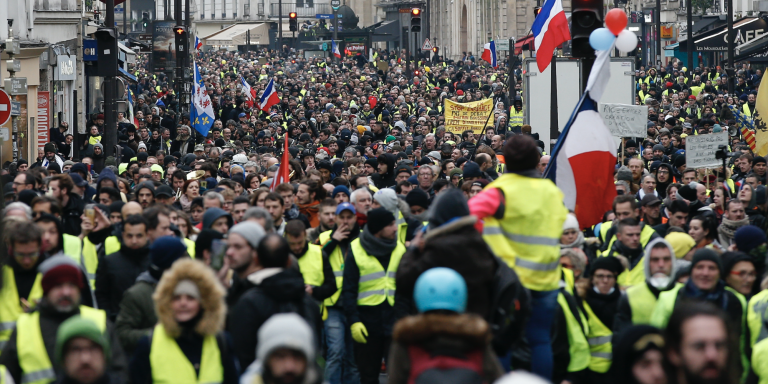INTELBRIEF
January 16, 2019
IntelBrief: The Globalization of Local Protests: The Case of France’s ‘Yellow Vests’

- For the ninth weekend in a row, protesters gathered in massive numbers in Paris and other French cities as part of the ‘Yellow Vests’ protests.
- On January 14, French President Emmanuel Macron expressed a desire to launch a months-long ‘national dialogue’ on issues raised by the gilets jaunes.
- What was once a true grassroots movement is now being diluted by external entities, including those on the far-right, seeking to tap into its momentum.
- Russian media has covered the protests closely, encouraging their spread, which contributes to Moscow’s goal of exacerbating division in the West.
.
The ‘Yellow Vests’ protests in France began as a local protest, something of a unique event in the age of manufactured outrage, but are now being amplified on social media by opportunists looking to promote their own agendas. In November 2018, upset about a rise in fuel taxes, French citizens began to display the yellow traffic vest that motorists are required to have in their vehicles. At first, protesters displayed these vests in their windshields, but as the protest grew in popularity, more drivers began wearing them. Fittingly, the traffic vests are designed to be easily seen and are thus a perfect choice for protesters who feel as if their concerns have been marginalized to the point where they are invisible to politicians. By late November, tens of thousands of people wearing the gilets jaunes engaged in the largest protests in France in several decades.
The protests have a uniquely French feel, in that they are scheduled for the weekends. Now entering their ninth consecutive weekend, the protests show no signs of weakening and have enlarged far beyond the specifics of the fuel tax to incorporate a wide array of grievances. Most of the protesters’ concerns stem from an economy that has left many workers behind, unequipped to deal with the competition ushered in by globalization. At times, the protests have turned violent, as a small group within the larger movement arrives with the intention to sow chaos, in a fashion similar to anti-globalization protesters (with Anarchists mixed in) elsewhere in the West. To date, protesters have caused millions of dollars in damage to properties in Paris, the heart of French tourism, with cars burned, shops ransacked, and violent clashes with police. The images of fires near the Arc de Triomphe have been covered at length by the press worldwide.
The protests are a serious challenge to the Macron government and to the notion that austerity for all but corporations is a sustainable economic and social model for the French. France has long maintained a strong labor movement and sentiment, while the Macron administration has passed measures viewed as more pro-business than pro-labor. After largely ignoring the protests for weeks, President Macron is now vowing to launch a ‘national dialogue’ with all of France about the issues raised. The fuel tax has been shelved for now, but the more significant issues of inequality and wealth disparities remain very much at the forefront of the debate.
The aspects of globalization responsible for driving the demonstrations have also ensured that the ostensibly local protests have ‘gone global’ as external entities seek to hijack or replicate the movement for their own aims. The gilets jaunes were not taking to the streets of Paris to demand that the U.K follow through with Brexit, although a small but vocal group in the U.K is agitating for a right-wing ‘yellow vest protest’ for Brexit. It is fittingly ironic that a protest looking to draw attention to the plight of the French worker is now seen as an international ‘brand’ or ‘franchise.' In the age of outrage where symbols are highly valued, the notoriety generated by the yellow vests is being used by groups across the ideological spectrum to advance their distinct agendas.The leaderless nature of the French protests has made it easy for others to co-opt its momentum. Never one to miss an opportunity to amplify divisions in the West, Russian media has extensively covered the Yellow Vests protests and encouraged its spread elsewhere. As with other issues, Russia is not inventing these divisions but rather exacerbating them through sophisticated disinformation campaigns and the hijacking of local causes for geopolitical ends.
.
For tailored research and analysis, please contact: info@thesoufancenter.org
[video width="960" height="540" mp4="https://thesoufancenter.org/wp-content/uploads/2019/01/IB-0116.mp4" poster="https://thesoufancenter.org/wp-content/uploads/2019/01/Screen-Shot-2019-01-15-at-22.53.19-1-e1547582268111.png"][/video]